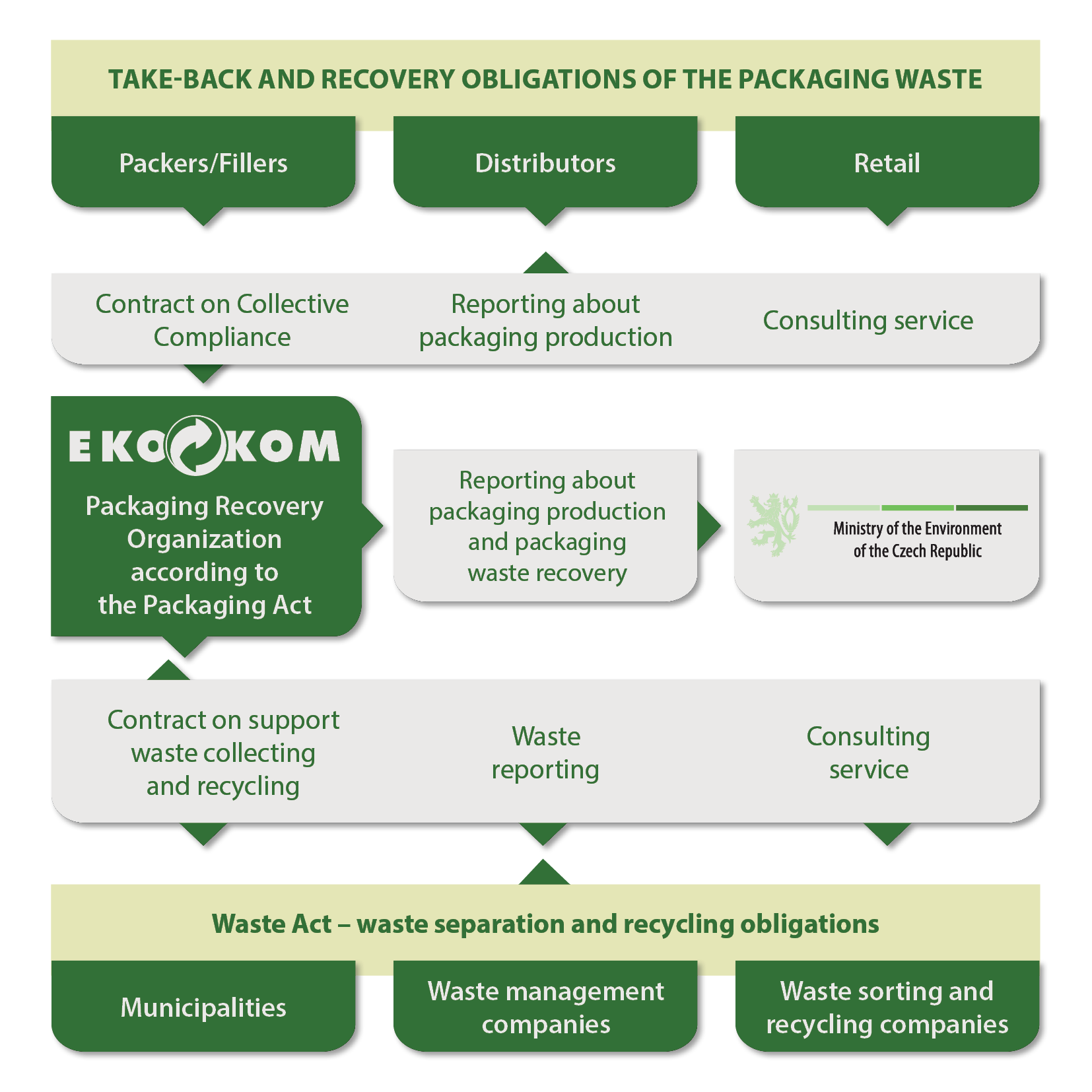
EKO‑KOM, a.s. is authorized packaging company, which provides associated compliance of take-back and recovery of packaging waste, based on the authorized decision made by Ministry of the Environment on 28th March 2002, which took effect on 30th March 2002 and based on extension of authorized decision made by Ministry of the Environment on 29th March 2005, which took effect on 21th April 2005. The take-back and recovery obligations based on articles of the Packaging Act 477/2001Coll. apply to any entity that places, or puts into circulation any packages or package products, mainly those who produce, import or sell. The entities could join the EKO‑KOM system and ensure obligations of take-back and recovery of packaging.
The EKO‑KOM System provides collection and recovery of packaging waste mainly through municipal schemes of separate collection. EKO‑KOM, a.s. co-finance costs of municipal separate collection of packaging waste from households and cooperate with waste management operators to ensure collection of packaging from industry and retail.
This solution is based on legal framework given by the packaging law and waste law:
On the one hand EKO‑KOM, a.s. enters into a Contract on Collective Complience with entities which put packaging on the market or into circulation. Based on these contracts, EKO‑KOM collects data concerning packaging production and accepts payments, the value of which depends on the reported packaging production.
On the other hand EKO‑KOM, a.s. enters into a Packaging Waste Collection and Recycling Contract with municipalities and entities authorised to handle waste. These subjects are then obliged to keep a register tracking the quantity of collected and recovered packaging waste, on the basis of which EKO‑KOM, a.s. financially contributes to the systems of collecting, sorting and utilising packaging waste.
The System follows similar patterns as in other EU countries, where systems provide the same services and make up an integral part of municipal waste management. Besides the associated compliance of take-back and recovery of packaging waste, EKO‑KOM provides other accompanied activities: statistics and information, expert and advisory, research and education.
The EKO‑KOM company has long achieved the level of recycling required by the State, in order that its clients be able to comply with their obligations related to take-back and recovery of packaging waste with the standard required by the law. In spite of the fact that, from the viewpoint of recycling, we are among the foremost countries of the EU, we have one of the most economical systems based on the unit costs per tonne of recycled waste. This unambiguously confirms the BIO Intelligence Service study, which was contracted by the European Commission and which, amongst other things, compares the costs expended for separating and recycling packaging in various countries of the European Union with the achieved high level of recycling. Thus, together with Czech towns and municipalities, industry in this country has created a system of waste separation and recycling that is one of the most effective in Europe
EKO‑KOM assures recovery and recycling of packaging waste within the terms of fulfilling statutory requirements on behalf of its clients. It is very important to sustain the adequate quality of the output product, which can be sold on European and global markets, for continued sales of separated reusable materials.
The EKO‑KOM Company was required to convince at least 65 % consumers to learn correct habits concerning waste separation in order to comply with all the statutory requirement on behalf of its clients. Maintaining the constant willingness of at least 65 % of consumers to use recovery services requires an effective mix of communication techniques, including standard advertising instruments and the method of long-term education. Consumer behaviour must be influenced from the aspect of separation quality, because the level of contamination of waste is directly related to the costs of the whole system and the stability of sales of the resulting reusable material.
The effectiveness of the entire system of packaging recycling is based primarily on cooperation with the municipalities and towns in providing for a sufficient number of accessible containers and their servicing. The treatment facilities providing for final separation of the waste and the final processors of the secondary raw materials form an essential link in the waste-separation chain. The actual recycling of some finally separated waste materials that are difficult to utilize must also be supported financially.
An accessible recovery network is a requirement for the inhabitants’ adequate participation in waste separation. It has been practically verified that if the distance inhabitants have to travel to the nearest container exceeds 400 meters, then a maximum of 5 % of the population will separate waste. Collection containers must be situated so that the standard distance travelled does not exceed 150 metres to ensure constant participation in waste separation by at least 65 % consumers. The current average distance to the nearest collection site is less than 90 metres, which means that we currently provide the quality of the collection network required by consumers in most of the country. The collection network is currently made up of more than containers for separate collection of paper, plastic, glass and beverage cartons and also metal to a lesser degree. This is supplemented by kerbside bag collection and other methods of collection such as civic amenity sites and buy-out centers.